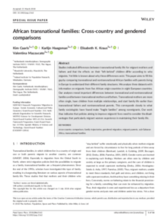Abstract
Studies indicated differences between transnational family life for migrant mothers and fathers and that the effects on their “left‐behind” children differ according to who migrates. Yet little is known about why these differences exist. This paper aims to fill this gap by comparing transnational and nontransnational African families with parents living in Europe to understand their different family structures. We analyse three datasets with information on migrants from five African origin countries in eight European countries. Our analyses reveal important differences between transnational and nontransnational families and between transnational mothers and fathers. Transnational mothers are more often single, have children from multiple relationships, and start family life earlier than transnational fathers and nontransnational parents. This corresponds closely to what family sociologists have found make “fragile families” among nonmigrants. Our work thus indicates that policies aiming to improve migrants' lives need to consider the disadvantages that particularly migrant women experience in maintaining their family life.
This article is part of the Special Issue of Population, Space and Place on Transnational Families

